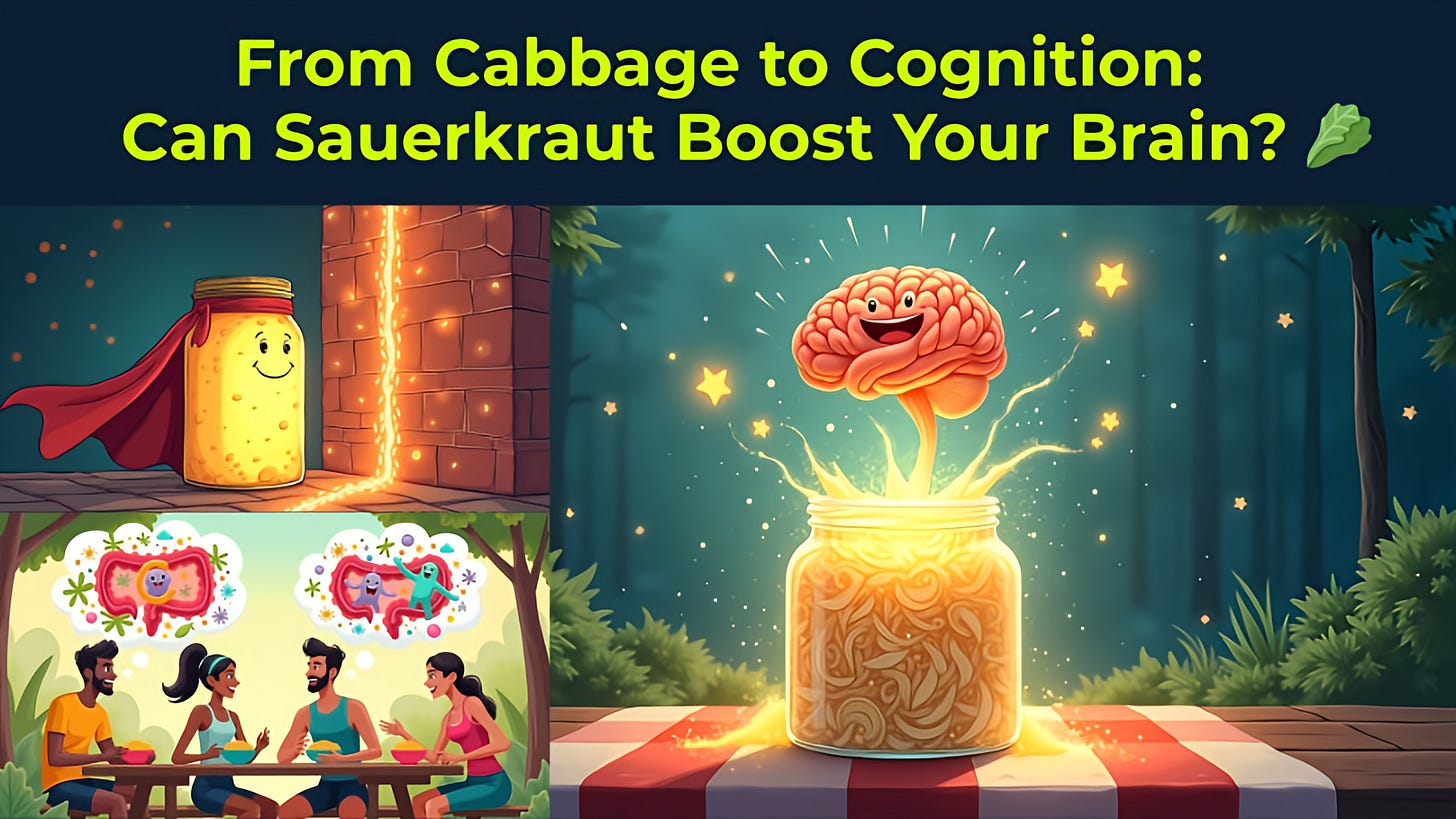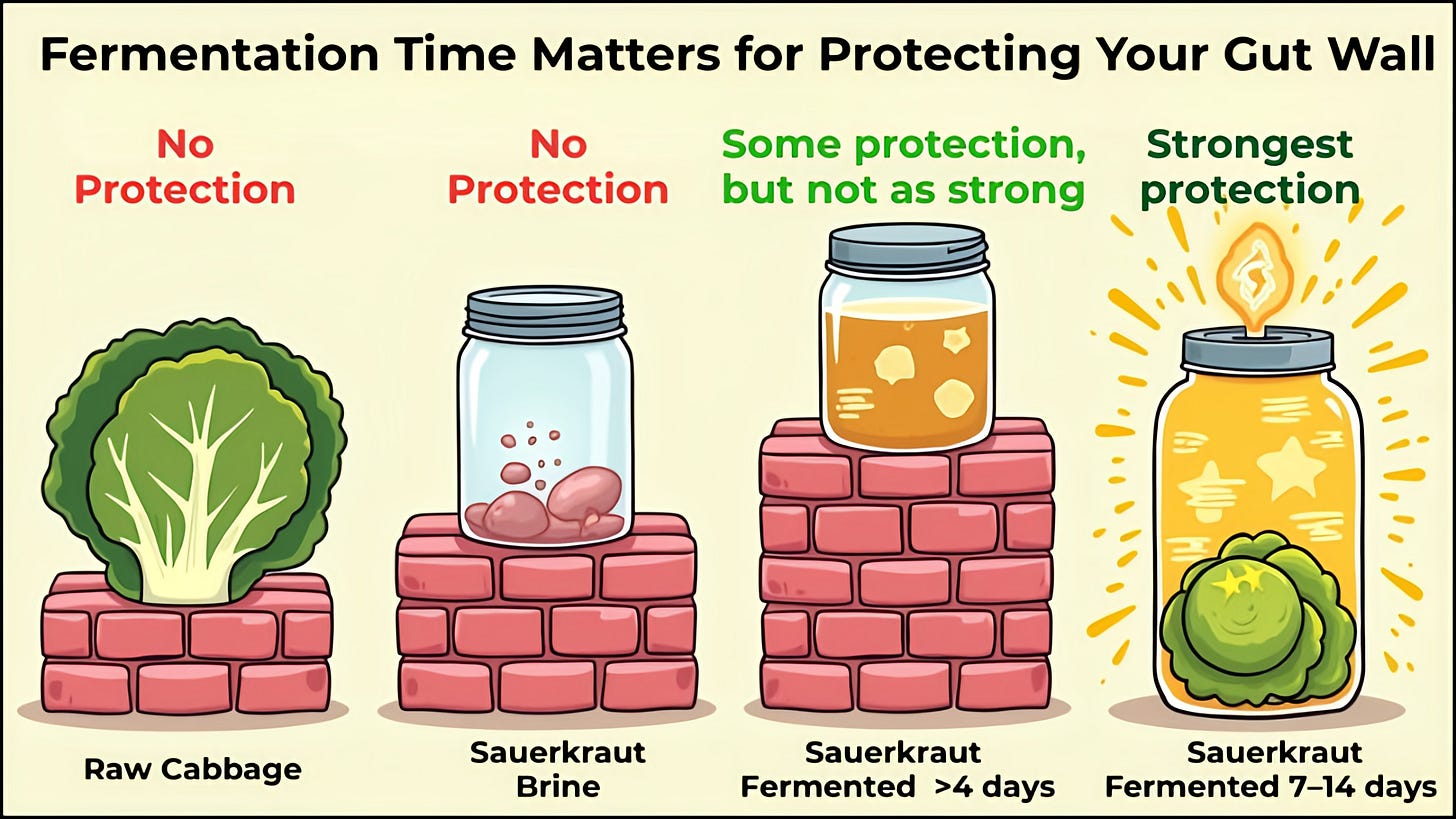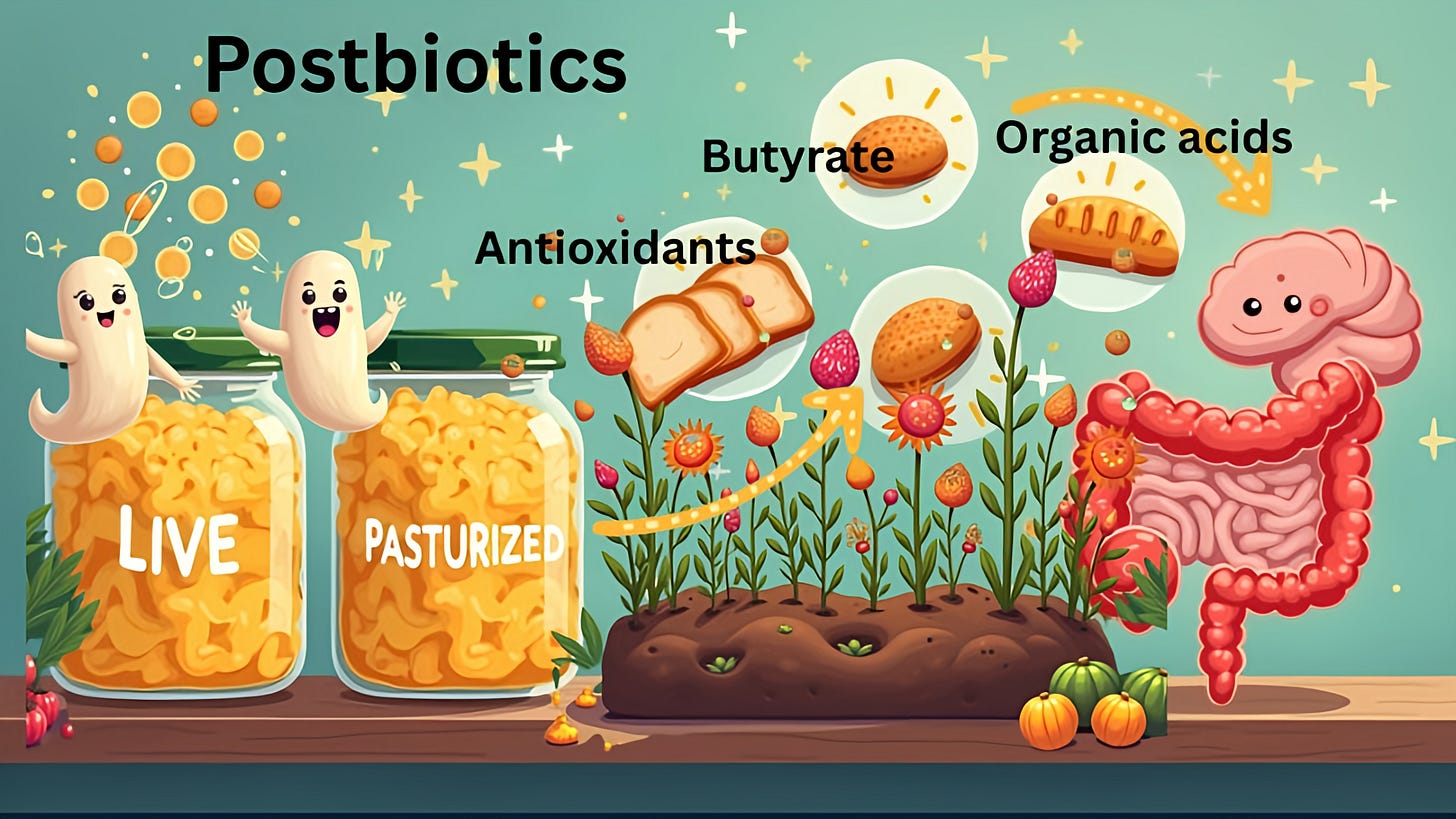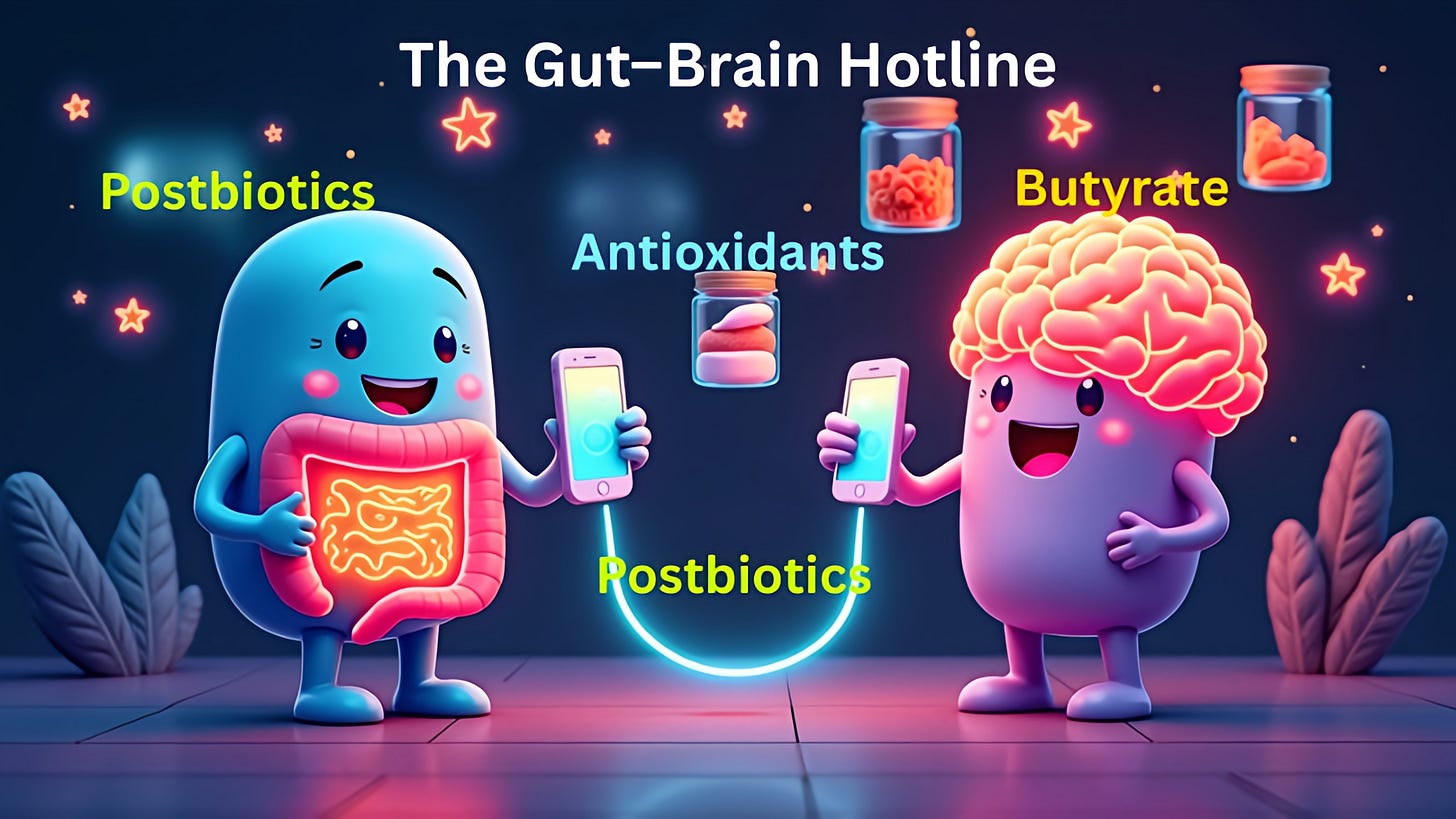From Cabbage to Cognition: Can Sauerkraut Boost Your Brain? 🥬
What human trials and lab studies really say about sauerkraut, your gut, and the brain.
From Grandma’s Kitchen to the Lab
Picture a jar of sauerkraut, crisp, tangy, heaped on your Fourth of July hot dog, the unsung hero of the cookout. As a scientist, I dismissed it as just a side, until my cousin swore her bloating vanished after a week of kraut. Skeptical, I tested a spoonful daily; by day five, my gut felt calmer. That sparked my dive into peer-reviewed studies on the gut–brain axis, where microbes orchestrate a biochemical hotline, sending neural and molecular signals to your brain. Could this humble cabbage be a microbial maestro, tuning your gut and perhaps your mind? In this series, I will explore the science behind sauerkraut’s surprising potential … starting with the safe bet: pasteurized sauerkraut. (Next article we will explore Live sauerkraut)
Your Gut’s a Party Town
Your gut’s like a bustling city, packed with bacteria, the same number as your own cells, a 1:1 match, with most throwing a party in your gut. 👉 Fun fact: these tiny microbes weigh just 0.2–0.3 kg, like a small apple, because they’re so much smaller than human cells! This bustling gut city shapes how you feel, and what you eat decides who thrives.
A 2024 study published in the journal Nutrients had 30 athletes eat a small bowl (250 grams) of pasteurized sauerkraut daily for 10 days. No live bugs, just heat-zapped cabbage. Their gut bacteria got a boost, with more gut-friendly types making compounds to calm and strengthen digestion. Some less helpful bacteria faded, especially troublemaking bacteria known to cause inflammation, which got evicted.
A few athletes felt bloated early on, but that eased after about a week. Their vitamin B12 levels dipped a bit (not a crisis, but worth watching). While not dangerous in the short term, this is a real nutritional trade-off that deserves more study. Blood tests even showed a temporary uptick in immune cells, like your body’s security team getting a pep talk. Functional pathways also shifted, showing changes in how bacteria handled cell wall building and nucleotide metabolism.
In 2025, the same group did a follow-up study and published again in Nutrients. This time, they had 40 recreational athletes eat pasteurized sauerkraut and then checked their gut a month later. Before the study started, their gut looked like soil in a garden. A month after eating sauerkraut, their guts were tidier and more balanced, like a neighborhood watch finally clicking. Even a month after stopping, many still had a more balanced gut, and the microbiomes across athletes looked more similar to each other. That suggests sauerkraut may gently guide gut bacteria to work together more consistently. Most participants in the study saw lasting benefits, with bacteria teaming up better across the group. These small studies suggest that sauerkraut shakes things up, even when the bacteria in it are “dead.”
Magic in a Jar 🥬
Sauerkraut is like a tiny chemistry lab in a jar. Fermentation transforms plain cabbage into a factory producing organic acids, vitamin C, and short-chain fatty acids (SCFAs) such as butyrate. Think of butyrate as a repair crew, patching cracks in your gut lining.
A study published in the journal Applied and Environmental Microbiology in 2023 tested how cabbage in different forms might affect gut health. The researchers worked with human gut cells in the lab, placed them under stress, and then exposed them to raw cabbage, sauerkraut brine, or sauerkraut itself. Raw cabbage did not help, and the salty liquid from sauerkraut (brine) also failed to protect the cells. But the sauerkraut itself, whether homemade or bought from a store, reduced inflammation and gave the gut cells protection.
The length of fermentation also mattered. Sauerkraut that had fermented for 7 to 14 days offered even stronger protection, almost like hiring a more skilled contractor to shore up your walls. A sturdier gut lining helps the gut and brain communicate more clearly, similar to the difference between a fuzzy walkie-talkie and a clear phone call.
Dead Bugs Still Work
Here’s the twist: you don’t need live bacteria. The athlete studies used pasteurized sauerkraut, microbes cooked to death. And they still provided beneficial effects
So what’s the trick? Postbiotics.
Picture bacteria as bakers who die but leave a perfect loaf behind. Butyrate, organic acids, antioxidants, these goodies stay after the heat. They nudge your gut’s good guys, calm the angry ones, and glue your gut lining shut. Grab a shelf-stable jar from the supermarket? Still works. My cousin’s bloat didn’t care if her kraut was pasteurized; it vanished either way. I tried a cheap jar from the store, same deal, less puff by day five. Live kraut’s great, but pasteurized is the low-risk starter kit, no fizz, no fuss.
The Gut–Brain Hotline
Your gut and brain are like besties on a group chat, always talking through nerves, immune signals, and molecules like butyrate. A 2021 Cell study had 45 adults eat six servings of fermented foods (kraut, yogurt, kimchi) for 10 weeks. Their gut communities became more diverse, and 19 markers of inflammation, including IL-6, dropped.
Why does that matter? Chronic inflammation is a well-known player in conditions like Alzheimer’s, Parkinson’s, and depression. These diseases often appear alongside gut problems, such as leaky gut walls or fewer beneficial microbes. That is why some scientists now call fermented foods “psychobiotics,” suggesting they may help with mood and memory.
The direct evidence for sauerkraut and brain health is still limited, but the hints are intriguing. My cousin says her head feels clearer after eating kraut, and I noticed sharper focus during my own experiment. Coincidence? Maybe not.
🛑 The Catch: Not a Magic Bullet 🛑
Hold the hot dog. Sauerkraut is not perfect for everyone. A 2022 Nutrients study found that some people actually felt worse when eating fermented foods, reporting spikes in anxiety or depression. That may have been due to stress rather than the kraut itself, but it is still a warning sign.
The athlete trials above had limits. They were small (30 to 40 participants), short (about 10 days), and one of the 2024 studies did not even include a control group for comparison. Pasteurized sauerkraut still showed benefits, but live kraut might be even more effective. Let’s talk about live sauerkraut in the next article.
There were also a few side effects. Some athletes had a temporary dip in vitamin B12 levels, which suggests diet balance matters if you eat kraut regularly. Early bloating was common too, although it usually settled down after a week.
And of course, lab studies on cells do not always translate directly to the complexity of human bodies. We still need larger, longer trials before making strong claims about the gut–brain connection. For now, the science is curious but not conclusive.
Your Next Forkful
Sauerkraut’s no myth, it boosts good bacteria and pumps out butyrate, per real studies. That could calm inflammation and maybe, just maybe, send cleaner signals to your brain. Alzheimer’s or mood fixes? Future labs will tell. For now, scoop some at your next tailgate, pasteurized for newbies, live if you’re bold.
How to Start: Grab unpasteurized sauerkraut from the fridge section at Whole Foods or Trader Joe’s for live bacteria, or try shelf-stable jars like Bubbies for postbiotic power. Start with a tablespoon daily, mix it into a salad, taco, or sandwich. I tossed mine on avocado toast; my cousin loves it with eggs. Feel lighter by day seven? You’re a scientist now. I’ve also made live sauerkraut at home … happy to share my starter tips if you’re curious.
☕ Enjoyed this post? Buy me a coffee here!
References
1. 2024 Athlete Trial (Nutrients)
Karačić A, Jovanović M, Jovanović M, et al. Short-term supplementation of sauerkraut induces changes in gut microbiota composition and immune responses in active athletes. Nutrients. 2024;16(4):562.
2. 2025 Follow-Up Study (Nutrients)
Zonjić J, Jovanović M, Karačić A, et al. Long-term effects of a short course of sauerkraut supplementation on the gut microbiota of active athletes. Nutrients. 2025;17(1):45.
3. 2023 Metabolome Study (Applied and Environmental Microbiology)
Wei L, Zhang X, Li Y, et al. The fermented cabbage metabolome and its protection of human gut cells from inflammation. Appl Environ Microbiol. 2025;91(3):e02234-22.
4. 2021 Stanford RCT (Cell)
Wastyk HC, Fragiadakis GK, Perelman D, et al. Gut-microbiota-targeted diets modulate human immune status. Cell. 2021;184(16):4137-4153.e14.
5. Review on Psychobiotics (Frontiers in Nutrition)
Oroojzadeh P, Sadeghi N, Rahimi M, et al. Psychobiotics: the influence of gut microbiota on mental health. Front Nutr. 2022;9:785234.
6. 2022 Mood Study (Nutrients)
Karbownik MS, Szymańska K, Jędrzejczak A, et al. Association between consumption of fermented food and severity of depressive and anxiety symptoms: a population-based study. Nutrients. 2022;14(7):1449.







Had no idea about sauerkraut! Thanks for the enlightenment 😊
An interesting read. I would love to try this. Do you have a recipe I could use? Thank you.